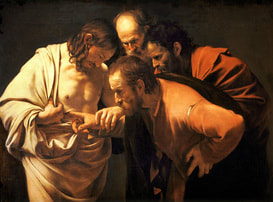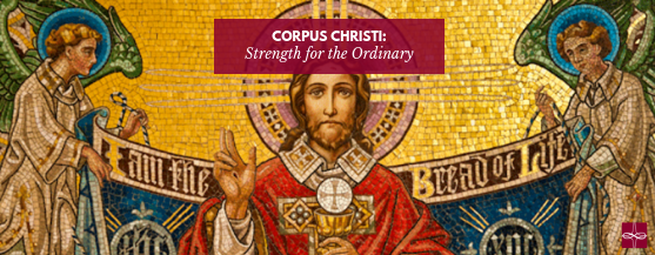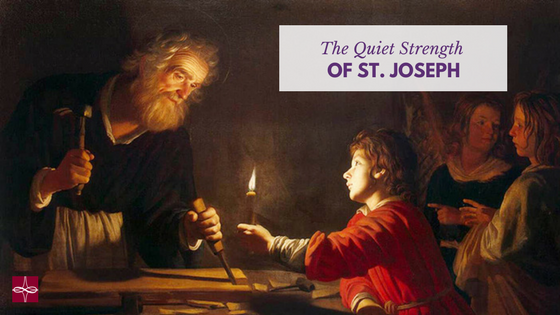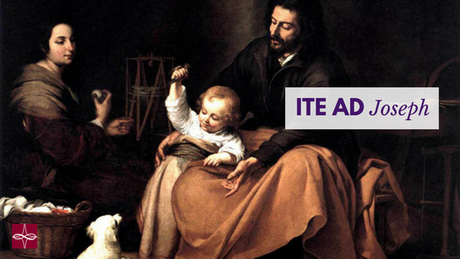|
Are you tired of the feasting? We are at the tail end of feasting after the Easter season with the celebration of the Solemnity of Corpus Christi last Sunday. We experienced the 50 days of Easter, the Solemnity of the Ascension of the Lord, Pentecost, the Solemnity of the Holy Trinity, and finally, the Solemnity of Corpus Christi. In my family, we have partaken in a fair share of feasting on treats, and I am almost ready for a period of fasting again. The transition from the Easter season into Ordinary Time can lead to a misunderstanding of what the Church is calling us to during this liturgical season. It is easy to see Ordinary Time as boring or as a time for laziness, but if we look at the liturgical calendar and journey along with the Apostles in the Scriptures, we can see that it is just the opposite. Reflecting back on the Scriptures read during Lent and the Triduum, we see the disciples’ confusion about what Jesus was preparing them for. He warned them often that He had to suffer, die, and rise, and yet they were still in hiding and unsure of their mission after the crucifixion and Resurrection. Scripture states that they were locked in the Upper Room in fear of the Jews after Christ’s death and then that they were left “looking intently at the sky” after Christ’s Ascension. It is not until Pentecost, when the Holy Spirit descends upon the disciples, that the gift of understanding is given to them and they are able to go forth and spread the Gospel message. In celebrating the Solemnities of the Ascension and Pentecost after Easter Sunday, we come to understand our role as Christians on mission. We are reminded that we too are equipped with the Holy Spirit for the call to go out to all the nations and proclaim the Good News, baptizing in the name of the Trinity. We next celebrate the Solemnity of the Holy Trinity, a day to contemplate that the Holy Trinity is relationship itself, and we are invited into that relational exchange of love among Father, Son and Holy Spirit. As the Catechism explains, "By the grace of Baptism ‘in the name of the Father and of the Son and of the Holy Spirit,’ we are called to share in the life of the Blessed Trinity” (CCC 264). This Solemnity invites us to ponder the vastness and majesty of God in three persons and His great love for His creation. Finally, the Church celebrates the Solemnity of Corpus Christi (Latin for “Body of Christ”). Christ, after the Ascension, remains with us in the bread and wine transformed into His Body and Blood during the celebration of the Mass. This Solemnity focuses our attention and hearts on the greatest gift to the Church: the Body, Blood, Soul and Divinity of our Lord in the Holy Eucharist. Together with the celebration of the other feasts after Easter Sunday, the celebration of Corpus Christi is a moment of grace given to us today that propels us into this season of Ordinary Time. If we look at the calendar, the Church has been preparing our hearts to enter into this celebration of Corpus Christi. We needed Jesus to establish the Eucharist (Holy Thursday), to suffer, die and rise (Triduum), to return to the Father (Ascension), and to send the Church an outpouring of understanding for Her mission through the Holy Spirit (Pentecost). As a result, we can ponder and enter into the life of the Holy Trinity (Solemnity of Holy Trinity). All of these feasts prepare the Church for the Solemnity of Corpus Christi and for our journey into Ordinary Time. The Holy Eucharist is the strength for our journey in the ordinary. The Body and Blood of Jesus assists us in following the will of God as we receive God Himself. The Solemnity of Corpus Christi can be celebrated with hope that Jesus is with us in this Holy Sacrament, and the Church is calling us to continued growth in Ordinary Time. Questions for Reflection: How can you use Ordinary Time in order to grow in your faith? What graces from Lent and Easter can help propel you into Ordinary Time?
0 Comments
This weekend is the feast of St. Patrick—one of the most popular saints in the Archdiocese of Washington where I grew up and arguably in the entire United States. But two days later on March 19, coming much more quietly and with far less fanfare in American culture, slips in the Solemnity of St. Joseph.
It is easy to lose the Solemnity of St. Joseph in the rigors of Lenten observances or because it comes on the heels of the day-long party that seems to happen every year on St. Patrick’s Day. Perhaps we often overlook this feast because we know so little about who St. Joseph was and what his life was like. Nevertheless, St. Joseph remains an incredibly important figure, especially for parents. Joseph is mentioned only a few times in the New Testament. We know from the Gospels that Joseph was a law-abiding and righteous man, and that he obeyed God’s will—especially when it was revealed to him directly by an angel. After these few mentions in the infancy narratives of Jesus, St. Joseph gently fades into the background and then disappears altogether from the Gospels. But the Church in her wisdom has made St. Joseph’s importance clear for those who are paying attention: he is mentioned in all four Eucharistic Prayers at Mass, as well as in the Divine Praises during Benediction at the end of Eucharistic adoration. But what makes St. Joseph so special? From what we can glean from the Gospels, St. Joseph was an ordinary man of deep faith who was called to become the foster-father of Christ. He became the earthly guardian of the Messiah, responsible for his upbringing and tasked with protecting him in his early life. St. Joseph’s commitment to his vocation as the husband of Mary and the foster father of Christ was so strong that upon being warned about the murderous intentions of King Herod, he fled immediately—in the middle of the night!—to Egypt. He did whatever it took, even leaving his entire life behind him, in order to keep his family safe. The little we see of him in the New Testament shows us a devout man who always trusted in God and took care of his family. St. Joseph, as the third member of the Holy Family, is the member who is the most like us—especially those of us who are parents. He was not born sinless, nor was he divine. He was a carpenter, a man of humble station who probably felt as though he had a monumentally important task thrust upon him. I think St. Joseph’s role in Christ’s life beautifully displays the role of a Christian parent in their child’s life. Parents are ordinary people who are tasked with the care and raising of new life. Like Joseph, we do not own our children or have sole claim over them; they are their own people, entrusted to our care and guidance until they grow old enough to do God’s will without our assistance. It is a difficult task, and at times overwhelming to ponder. And yet there is St. Joseph, who was tasked with raising the very Son of God. Joseph shows us that we do not need to be perfect in our roles, only willing to be guided by God as we place our trust in Him. Just as I strive to be like Mary in my vocation as a wife and mother, I pray that my husband will be like Joseph. St. Joseph is the ultimate husband and father, a faithful man of quiet strength, protector of Mary’s virginity, and guide of Christ’s earthly childhood. Above all, St. Joseph shows us the beauty of a life lived in obedience to God’s will. Questions for Reflection: How can you grow closer to St. Joseph throughout this Lenten season? What can you learn from St. Joseph’s example of obedience and trust? “Blessed be St. Joseph, her most chaste spouse” — these words, taken from the Divine Praises of our Church (a prayer that is often used at the end of Eucharistic Adoration), remind us of the important role that St. Joseph plays as the patron of the Universal Church. St. Joseph is the foster father of Jesus, “most chaste spouse” of Mary, but he is also our guide. There are exactly zero words of St. Joseph recorded in all of scripture, yet the role that he plays is not to be underestimated. He teaches us how to live in obedience, persevere in holiness and chastity, and love well. The obedience that this holy patron showed to the will of God is nothing short of extraordinary. He did this first by accepting the message of the angel to take Mary as his wife, then by protecting his family as he fled with them to Egypt, but most importantly, in those quiet, unlogged hours at home with Mary and Jesus in Nazareth. Although his life did not unfold as he would have anticipated, his obedience and docility to God’s will allowed him to play a crucial role in the life of Christ and ultimately in the story of our salvation. St. Joseph’s perseverance in holiness and chastity sets a very clear example before us. His life is a compelling reminder for us that to do the will of God, we need only be obedient to the present moment and faithful to the higher calling that is ours by nature of our baptism. In a world that sees chastity as outdated and nearly impossible, he reminds us that pursuing it is not only important for our own lives of virtue, but salvific for others. St. Joseph also teaches us how to love well. The gentle striving of St. Joseph, both as he led Mary and Jesus, and now as he leads our Church, can be summed up by these words of St. Josemaria Escriva, “God always asks more: His ways are not the ways of men. St. Joseph, more than anyone else before or since, learned from Jesus to be alert to recognize God’s wonders, to have his mind and heart awake.” Several years ago, a spiritual director suggested that I start to pray every day to St. Joseph for my future husband. With the following prayer, I beg his intercession to not only allow me to persevere in obedience and chastity, but also with the sure knowledge that he will protect my future husband and family. Guardian of virgins and father, St. Joseph, to whose faithful custody Innocents itself, Christ Jesus, and Mary, Virgin of virgins was committed; I pray and beseech thee by each of these dear pledges, Jesus and Mary, that, being preserved from all uncleanness, I may with spotless mind, pure heart, and a chaste body, ever serve Jesus and Mary most chastely all the days of my life. Amen. May the intercession of St. Joseph allow us to persevere in obedience, chastity, and love! *Ite ad Joseph is Latin for “Go to Joseph” and admonishes us to turn to St. Joseph’s intercession and guidance. Question for Reflection: Following the example of St. Joseph, how might you grow in your ability to be obedient to the present moment? This year, the Church experienced the collision of a feast day and a day of fasting on March 25. For some, the day was approached with awkwardness, “This is both a Marian Feast Day and the Day of the Cross?” But, as Holy Mother Church exercises her wisdom, She encouraged the faithful to first enter into the solemn day of Good Friday on March 25th, while today, April 4th, we celebrate the Feast of the Annunciation. The “stacking” of these Holy Days happens irregularly in the Church’s history, and we will never experience them again in our lifetime (unless you live to 2157). Because of the moving of the Feast of the Annunciation, we continue to have the opportunity to soak up all the graces we can from the two days, to ponder the beauty and similarities of the day of feast and the day of fast. “Hail full of Grace!” (Luke 1:28) “Hail King of the Jews” (Mark 15:18) In Scripture, the word “hail” is synonymous with a naming, a giving of a title. As Mary is given the title “Full of Grace,” our Lord is given the title “King of the Jews.” These titles are given to reveal their deeper identity—Mary, as the Mother of Christ; Jesus, as the Savior of all. Just as Jesus asks the disciples, “Who do you say that I am?” (Mark 8:28), we too must ask ourselves this question. What does it mean to venerate Mary the Mother of God and Jesus Christ? What do these titles and these identities mean to us as Catholics living in the world today? “May it be done to me according to your will.” (Luke 1: 38) “Not my will, but yours be done.” (Luke 22:42) Mary’s faith and trust in the Lord carries her to make the journey to a city of Judah to visit Elizabeth. This prayer then carries her to Bethlehem, to the journey to Jerusalem, to the raising of the Child Jesus, to the act of faith at Cana, and to the foot of the Cross. Jesus’ prayer in the Garden of Gethsemane, too, carries Him to make the journey to Calvary, to make the greatest Sacrifice for the sake of our sins. These prayers of trust in Nazareth at the Annunciation and in the Garden of Gethsemane both find their glory on Calvary. When we are presented with moments to trust God, do we make that act of trusting surrender or do we run? Imagine if Mary operated out of fear and Jesus rejected His Cross. Let us pray to Our Lady and Her Son to increase in us faith and confidence to walk this journey on earth to our heavenly home. “The child to be born will be called holy, the Son of God” (Luke 1:34) “Truly this man was the Son of God.” (Mark 15:39) As the Angel of the Lord announces to Mary that the child within her womb will be the Son of God, the centurion at Calvary proclaims that Jesus is “truly… the Son of God.” Mary’s faith in the Lord brings others to the salvific realization that Jesus is the Son of God, the Messiah! Due to her faithfulness and receptivity to the Holy Spirit, she bears the Son, bringing Jesus, bringing Redemption, to the world. The Angel of the Lord comes to Mary to announce His Divinity. Let us sit with Mary and find Her Son through her receptive heart. It makes sense that we encountered a bit of awkwardness at the clashing of the Annunciation and Good Friday, but these days reveal the paradox of the Christian Faith. We cannot have one without the other; in suffering comes joy. Let us cling to Mary’s motherly heart and ask her to show us the way to her Son. As we venerate Mary on the Feast of the Annunciation, may Her faithfulness bring us to a deeper faithfulness in Her Son. As we celebrate the Annunciation, the conception of Jesus Christ, we remember the birth of Holy Mother Church through the flowing of Blood and Water from the side of Jesus on the cross. This demonstrates that Jesus is the Beginning and the End, the Alpha and the Omega. These stories, the Annunciation and Good Friday, are actually our own and show how our “yes” can be used by God to bring about the salvation of the world in unexpected ways. May Mary’s “yes” to God’s plan through the Angel Gabriel and Jesus’ “yes” to the will of the Father through the Cross be our joy throughout this Easter Season.  Poor Thomas! One remark by my namesake and he’s forever branded as “Doubting Thomas.” The Church doesn’t honor him each July 3rd for this, however, but for what is absolutely one of the most explicit Professions of Faith uttered in the New Testament: “My Lord and my God!” (see John 20: 24-29, c.f. Luke 7:1-10) In those five words, Thomas boldly expresses his revived belief in his resurrected Master and testifies to His divinity, ready to once again follow Christ and evangelize the world about Him. While this redeeming witness is indeed memorable, it is important to not lose sight of another of Thomas’ statements as recorded in John’s gospel, which shows us more about his personality and in turn, our own faith in Christ, “the assurance of things hoped for, the conviction of things not seen” (Hebrews 11:1). This other mention of Thomas occurs when Jesus decides to travel to the village of Bethany in Judea to raise Lazarus, thus coming dangerously close to Jerusalem (see John 10:22-39, c.f. Mark 10:32-34). Remembering how the Jews there had earlier tried to stone Jesus, the disciples must have felt apprehensive about undertaking such a risky journey (see John 11:8). Thomas, however, seeing Jesus’ determination, exhorts them saying, “Let us also go, that we may die with him” (John 11:16). Brave words for a doubter! Pope Benedict XVI even characterized Thomas’ sincere resolve to follow his Master as something which is “truly exemplary and offers us a valuable lesson: it reveals his total readiness to stand by Jesus, to the point of identifying his own destiny with that of Jesus and of desiring to share with him the supreme trial of death” (September 27, 2006 General Audience). This is the very definition of the Christian life! A life with Jesus is to be with Him through times of joy, peace, hope, success, and prosperity, as well as uncertainty, loss, sorrow, ridicule, and persecution. This is “no sugarplum” as Benedict describes it in Jesus of Nazareth (pg. 67), but without Christ what can one hope for to carry him or her through the trials of life? What would be the point in continuing on? In his final five words recorded in the Bible, Thomas redeems himself after doubting Christ by exclaiming “My Lord and my God!”. The wounds he touched confirm, undoubtedly, the Identity of Christ, the truth of His Message, and the authenticity of God’s infinite Love, not just for Thomas, but all believers! St. Augustine comments on this: Thomas “saw and touched the man, and acknowledged the God whom he neither saw nor touched; but by the means of what he saw and touched, he now put far away from him every doubt, and believed the other” (In ev. Jo. 121, 5). It is important to remember that Saint Thomas, like all the apostles, was personally chosen by Christ in spite of their weaknesses and lack of understanding. But Christ did not pick worthless men! Rather, their failings are a reminder that holiness is a gift from God and not a human creation, given to us, who have our own weaknesses, so God can transform them into the loving image of Christ and mature our faith. Jesus also permitted Thomas to doubt after the resurrection but did not abandon him in those doubts, instead allowing him to bear witness to the truth of the resurrection and thus verify the whole Christian message (see 1 Corinthians 15:14). Finally, we are called to not give in to our doubts regarding God, our dignity and worth, or even hard Church teachings no matter how unpopular they may seem! By looking to Saint Thomas as a model (and by praying to him for guidance), may we find comfort in our insecurities, hope in the future, and the encouragement to persevere through the difficulties of life on the way to our final rendezvous with our Lord and our God. Thomas Wong is an undergraduate student at The Catholic University of America and a member of the Catholic University Knights of Columbus.
"The apostolate of the laity derives from their Christian vocation and the Church can never be without it."
These words come from the opening lines of the “Decree on the Apostolate of the Laity” (Apostolicam Actuositatem), one of the nine decrees that come out of the Second Vatican Council. They are quite moving and powerful documents that were handed down to us by the council fathers. This particular document on the laity shows that the Church is dependent on the apostolate of all people. But the term “apostolate” seems so daunting; clearly the word is rooted in the idea of being an apostle. I tend to think back to the Twelve Apostles, which creates a certain amount of anxiety. How can I even think about living up to the great examples of these twelve? Yet they are our example, and our apostleship is essential to the life of the Church. In the Church we tend to use the word apostle quite a bit and in many different ways. It appears in terms such as: apostolic, apostolate, and apostleship. To find a secular answer, I looked up the word “apostle” in a Merriam-Webster dictionary. In using a dictionary, my hope was that I might come to a better understanding of what it means to be an apostle. The first definition that I came across for apostle was "one sent on a mission." This first meaning really helps expand the idea of the New Evangelization in simple terms. The discovery of this definition led me to formulate the following question: "What is our mission as baptized Catholics?" This is a very important question that has been the subject of major debate. A simple answer is that we are called to go out into the world around us and proclaim the Good News of our Lord, Jesus Christ. How this is accomplished is a decision that must be made by each one of us. We must find our own niche in the greater mission of Christ. We have been given a divine mission that we must go out and complete. An interesting dilemma of this universal apostolic call is that for some reason people tend to shy away from it. I think that people tend to think that they are not worthy of such a calling or that they are not holy enough. Nothing could be further from the truth. We have all been given the necessary gifts from God to be able to be an apostle. These gifts are not always automatically known to us. Because of this, it is essential that we go out into the world and discover what our God-given talents are. Once we have become aware of our gifts, the task at hand becomes more manageable and attainable. Personally, I have found that being an apostle in the world today can be quite difficult. Through my active search and prayer to recognize the gifts and talents God has given me, I have discovered that I am someone who is easy to talk to. In response to this realization, I make myself available for people, especially my close friends, and I make sure that I both listen and give general advice when necessary. Doing this, however, can be difficult because there are many instances when time is limited, and I need to make a decision about what to put on hold. This can be difficult, so I stop to think about the things on my agenda versus the needs of the person seeking my counsel. Taking this time to reflect makes the decision quite clear. I developed a series of questions that has helped me in this process. I’ve found it very beneficial to go over them every now and again, particularly during the Lenten season. The questions are: Do I understand what it means to be a true apostle of Christ? Do I have an understanding of my mission at this current time in my life? Am I making decisions that help in my mission? Do I understand the gifts that God has given me to fulfill my mission? Do I thank God for these gifts and abilities? My hope is that you find these questions as helpful as I have. Mary, Queen of the Apostles, pray for us! Pat Fricchione is the Research & Production Associate for the Catholic Apostolate Center. |
Details
Archives
July 2024
Categories
All
|
About |
Media |
© COPYRIGHT 2024 | ALL RIGHTS RESERVED










 RSS Feed
RSS Feed